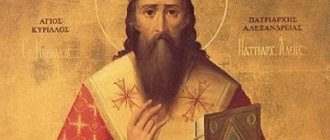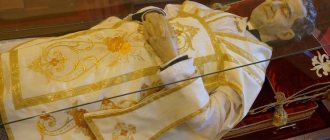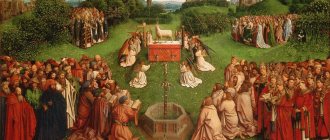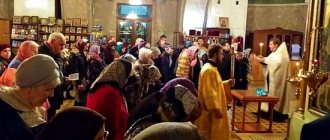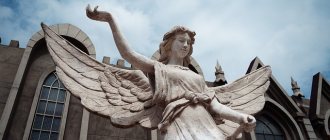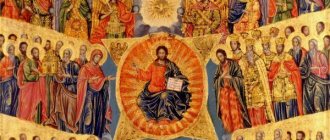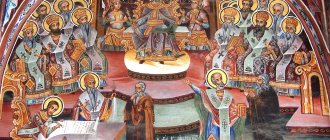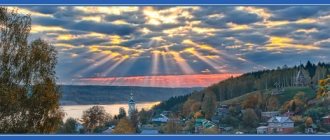Saint
(
Church Slav. svѧtítєl
; other Greek. ἀρχιερεύς) - bishop[1].
The word “hierarch” in the meaning of “bishop” is used in liturgical texts, for example:
| Today, when we return, we rejoice, / singing in the psalms and songs of the Lord, / and honoring Him, the sacred Canopy, / the animated Icon, the incontainable Word that contains: / for the Lord is brought forth, / more than the nature of the flesh, / and the great saint Zechariah accepts this with joy, / like God's Dwelling [2] |
(1st stichera with “I cried to the Lord” at Great Vespers, feast of the Entry into the Temple of the Most Holy Theotokos) Original Greek text of the stichera
? ες, τιμῶντες καὶ τὴν αὐτοῦ, ἡγιασμένην σκηνήν, τὴν ἔμψυχον κιβωτόν, ?? ῇ σαρκὶ νηπιάζουσα, καὶ Ἀρχιερεὺς ὁ μέγας, Ζαχαρίας δέχεται, εὐφραινόμ ενος ταύτην , ὡς Θεοῦ κατοικητήριον.
In addition, in the Orthodox Church the name “hierarchs” is adopted for saints from the episcopal rank, revered by the church as heads of individual church communities, who, with their holy lives and righteous shepherding, fulfilled God’s providence for the Church in its movement towards the Kingdom of Heaven. The memory of the most important saints is celebrated on the day of the Council of the Three Hierarchs.
Initially, the veneration of bishops was concentrated in local churches; each local community honored and celebrated the memory of all its primates (bishops) from the time of its founding (except, of course, those who fell into heresy or otherwise found themselves unworthy). The names of bishops were included in diptychs and regularly recalled during services.
Sozomen in his Church History (5th century) also speaks of the annual honoring of the memory of saints as an established practice; just like the martyrs, their memory was celebrated on the days of their repose. As the church-wide cult of individual saints developed, the veneration of the saints outgrew the boundaries of their dioceses and became church-wide. This was facilitated by the formation of a hierarchical structure of church jurisdiction (patriarchate, archdiocese, metropolitanate), when the primates of the older churches were revered by the entire church region. Thus, among the saints all the Roman popes of the first centuries of Christianity are revered, almost all the patriarchs of Constantinople, starting with Mitrophan (315-325 reign) and up to Eustathius (1019-1025 reign), except for those who fell into heresy, left the department or led unworthy life.
Subsequently, significant selectivity appeared in the canonization of bishops, and this testifies to a certain change in the concept of saintly holiness: the emphasis is transferred from righteous shepherding to the personal asceticism of the bishop and his role in the organization of church life. This change in concept was apparently due to the spread of universal veneration to the saints, when only certain locally venerated bishops are among the saints venerated by the entire church (which implies selectivity).
There is a novella by Emperor Leo the Wise (886-911 reign), in which it is prescribed that throughout the entire Greek Church, along with the apostles and martyrs, the memory of the seven most famous saints should be celebrated: Athanasius of Alexandria, Basil the Great, Gregory the Theologian, Gregory of Nyssa, John Chrysostom , Cyril of Alexandria and Epiphanius of Cyprus. One must think that this decree consolidated an already established practice, and this shows that selectivity was already inherent in it.
In the Russian Church, selectivity in the veneration of saints has taken place from the very beginning. The first Russian saint to whom veneration is established is St. Leonty, third bishop of Rostov (d. c. 1077). The celebration of his memory was first held in Rostov in 1190 on the day of the discovery of his relics (May 23); It is characteristic that the relics of his successor Isaiah were discovered at the same time, but veneration of his memory was not established; selectivity in this case was due to the miracles that took place at the tomb of St. Leontia. Among the earliest canonized saints, whose veneration arose soon after their death, are the Moscow Metropolitans Peter, Alexy and Jonah, St. Stefan Permsky.
In honor of the saints, the fourth particle is taken out from the “nine-time” prosphora. In the Russian rite of proskomedia they remember: “ Like our holy fathers, saints: Basil the Great, Gregory the Theologian and John Chrysostom; Athanasius and Cyril of Alexandria, Nicholas of Myra, Michael of Kyiv, Peter, Alexy, Jonah, Philip and Hermogen of Moscow, Nikita of Novgorod, Leonty of Rostov, and all the holy hierarchs
».
The Greek rite stops at the name of St. Nicholas, in the Jerusalem service books St. is added to the list of saints. John the Merciful (Patriarch of Alexandria).
Notes
- [commons.wikimedia.org/w/index.php?title=File%3A%D0%9F%D0%BE%D0%BB%D0%BD%D1%8B%D0%B9_%D1%86%D0%B5 %D1%80%D0%BA%D0%BE%D0%B2%D0%BD%D0%BE%D1%81%D0%BB%D0%B0%D0%B2%D1%8F%D0%BD%D1 %81%D0%BA%D0%B8%D0%B9_%D1%81%D0%BB%D0%BE%D0%B2%D0%B0%D1%80%D1%8C_(%D0%9F%D1% 80%D0%BE%D1%82%D0%BE%D0%B8%D0%B5%D1%80%D0%B5%D0%B9_%D0%93.%D0%94%D1%8C%D1%8F %D1%87%D0%B5%D0%BD%D0%BA%D0%BE).djvu&page=584 Complete Church Slavonic dictionary Archpriest Grigory Dyachenko. p. 584]
- [azbyka.ru/bogosluzhenie/mineia/vved02.shtml Festive mineaia. Presentation of the Most Holy Theotokos into the Temple • Great Vespers]
| Faces of holiness in Orthodoxy |
| Apostle | Unmercenary | Blessed | Blessed | Godfather | Great Martyr | Confessor | Martyr | Righteous | Forefather | Venerable Martyr | Reverend | Reverend Confessor | Prophet | Equal to the Apostles | Saint | Priest Confessor | Hieromartyr | Stylite | Passion-bearer | Miracle Worker | Holy Fool |
The meaning of the word saint
Since Saint Theodosius of Uglitsky wanted to have a successor to his hierarchical see in Yelets archimandrite, and as the abbot of the Svensky Monastery Maksimovich was known to him from the best side back in Kiev, Saint Theodosius, in consultation with the authorities, summoned Maksimovich to himself (in the middle of 1695) and ordained him as an archimandrite of the Yelets monastery, which he himself had ruled until then.
Since Saint Theodosius of Uglich wanted to have in Yelets archimandrite a successor to his hierarchal see (as the abbot of the Svensky Monastery, Maksimovich was known to him from the best side back in Kiev), Saint Theodosius, after a conference with the authorities, summoned Maksimovich to himself and ordained him as archimandrite of Yelets monastery, which he had previously managed himself.
He, the saint, took a branch with a flower from above that cross of the Lord, and from that branch he, the saint, took a part, put it in her mouth, and she, Marya, was given health, and he put that branch in her, Marya, left hand ", "and what kind of speeches he, the saint, spoke to Marya, and she answered him, and she announced a letter to Marya.” This “letter” became the main basis for the investigation of the “miracle”.
Among them are Saint Leonty of Rostov and the famous Novgorod Archbishop John, who lived even before the Mongol invasion; Moscow saints and the first Moscow miracle workers Peter and Alexei (Alexiy); the enlightener of Perm, Saint Stephen; Metropolitans of Moscow and All Rus' Macarius and Philip Kolychev.
Next to him, Saint Nicholas saw the Most Holy Theotokos placing the holy omophorion on his shoulder.
The girl was put under guard in Solvychegodsk, and during interrogation, Marya testified that in 1733, “she, Marya, was seriously ill and weakened, in which she lay for three months, and she prayed for relief from that grief, calling on the saint to help her.” ... Nicholas... according to her prayer in the same sorrow, he, St. Nicholas the Wonderworker, to her, Marya, in the night of this year... in hierarchal robes he himself came to her, holding the cross of the Lord in his right hands, and a burning candle in his left.
In the heat of denunciation, Saint Nicholas, burning with zeal for the Lord, even struck the false teacher, for which he was deprived of his holy omophorion and put into custody.
In 1325, the saint moved the primate see from Vladimir to Moscow, thereby marking the beginning of the rise and establishment of Moscow as a spiritual center.
Reporting this to the public, Archimandrite Antoninus stated that he did not lose hope that sooner or later he would find a complete list of this “Other Life” in Greek in the libraries of Athenian monasteries, or that one would be found in other libraries of the East or West, but for now he considered it possible to conclude, that undoubtedly (?) there were two Saint Nicholas, miracle workers of Myra, who lived at a distance of 200 years from each other: 1) Saint Nicholas, who lived during the time of the emperors Diocletian and Constantine the Great in the 3rd-4th century, and 2) Saint Nicholas (of the archimandrites Zion Monastery), who lived in the 6th century under Emperor Justinian.
Excerpt characterizing the Saint
- He will treat the people properly! - said a thin craftsman with a scraggly beard and frowning eyebrows. - Well, he sucked our blood - and that’s it. He drove us and drove us - all week. And now he brought it to the last end, and left. Seeing the people and the bloody man, the worker who had been speaking fell silent, and all the shoemakers, with hasty curiosity, joined the moving crowd. -Where are the people going? - It is known where, he goes to the authorities. - Well, did our power really not take over? - And you thought how! Look what the people are saying. Questions and answers were heard. The kisser, taking advantage of the increase in the crowd, fell behind the people and returned to his tavern. The tall fellow, not noticing the disappearance of his enemy the kisser, waving his bare arm, did not stop talking, thereby drawing everyone’s attention to himself. The people mostly pressed on him, expecting from him to get a solution to all the questions that occupied them. - Show him order, show him the law, that’s what the authorities are in charge of! Is that what I say, Orthodox? - said the tall fellow, smiling slightly. – He thinks, and there are no authorities? Is it possible without bosses? Otherwise, you never know how to rob them. - What nonsense to say! - responded in the crowd. - Well, then they’ll abandon Moscow! They told you to laugh, but you believed it. You never know how many of our troops are coming. So they let him in! That's what the authorities do. “Listen to what the people are saying,” they said, pointing to the tall fellow. Near the wall of China City, another small group of people surrounded a man in a frieze overcoat holding a paper in his hands. - The decree, the decree is being read! The decree is being read! - was heard in the crowd, and people rushed to the reader. A man in a frieze overcoat was reading a poster dated August 31st. When the crowd surrounded him, he seemed embarrassed, but in response to the demand of the tall fellow who had pushed ahead of him, with a slight trembling in his voice, he began to read the poster from the beginning. “Tomorrow I’m going early to the Most Serene Prince,” he read (the brightening one! - the tall fellow solemnly repeated, smiling with his mouth and frowning his eyebrows), “to talk with him, act and help the troops exterminate the villains; We too will become the spirit of them...” the reader continued and stopped (“Saw?” the little one shouted victoriously. “He will untie you all the distance...”) ... - to eradicate and send these guests to hell; I’ll come back for lunch, and we’ll get down to business, we’ll do it, we’ll finish it, and we’ll get rid of the villains.” The last words were read by the reader in complete silence. The tall fellow sadly lowered his head. It was obvious that no one understood these last words. In particular, the words: “I will come tomorrow for lunch,” apparently even upset both the reader and the listeners. The understanding of the people was in a high mood, and this was too simple and unnecessary understandable; this was the very thing that each of them could say and that therefore a decree emanating from a higher power could not speak. Everyone stood in dejected silence. The tall fellow moved his lips and staggered. “I should ask him!.. That’s what he is?.. Well, he asked!.. But then... He’ll point out...” was suddenly heard in the back rows of the crowd, and everyone’s attention turned to the droshky of the police chief, accompanied by two mounted dragoons. The police chief, who had gone that morning by order of the count to burn the barges and, on the occasion of this order, had rescued a large sum of money that was in his pocket at that moment, seeing a crowd of people moving towards him, ordered the coachman to stop. - What kind of people? - he shouted at the people, scattered and timidly approaching the droshky. - What kind of people? I'm asking you? - repeated the police chief, who did not receive an answer. “They, your honor,” said the clerk in the frieze overcoat, “they, your highness, at the announcement of the most illustrious count, without sparing their lives, wanted to serve, and not like some kind of riot, as said from the most illustrious count...” “The count did not leave, he here, and there will be orders about you,” said the police chief. - Let's go! - he said to the coachman. The crowd stopped, crowding around those who had heard what the authorities said, and looking at the droshky driving away. At that time, the police chief looked around in fear and said something to the coachman, and his horses went faster. - Cheating, guys! Lead to it yourself! - shouted the voice of a tall guy. - Don't let me go, guys! Let him submit the report! Hold it! - voices shouted, and people ran after the droshky. The crowd behind the police chief, talking noisily, headed to the Lubyanka. - Well, the gentlemen and the merchants have left, and that’s why we are lost? Well, we are dogs, or what! – was heard more often in the crowd. On the evening of September 1, after his meeting with Kutuzov, Count Rastopchin, upset and offended by the fact that he was not invited to the military council, that Kutuzov did not pay any attention to his proposal to take part in the defense of the capital, and surprised by the new look that opened up to him in the camp , in which the question of the calm of the capital and its patriotic mood turned out to be not only secondary, but completely unnecessary and insignificant - upset, offended and surprised by all this, Count Rostopchin returned to Moscow. After dinner, the count, without undressing, lay down on the sofa and at one o'clock was awakened by a courier who brought him a letter from Kutuzov. The letter said that since the troops were retreating to the Ryazan road outside Moscow, would the count like to send police officials to lead the troops through the city. This news was not news to Rostopchin. Not only from yesterday’s meeting with Kutuzov on Poklonnaya Hill, but also from the Battle of Borodino itself, when all the generals who came to Moscow unanimously said that another battle could not be fought, and when, with the count’s permission, every night government property and residents were already removing up to half let's leave - Count Rastopchin knew that Moscow would be abandoned; but nevertheless, this news, communicated in the form of a simple note with an order from Kutuzov and received at night, during his first sleep, surprised and irritated the count.
Prayers
Troparion, kontakion, common magnification of the saint
Troparion, tone 4
The rule of faith and the image of meekness, / the teacher of self-control / show you to your flock / Even the things of the Truth, / for this sake you have acquired high humility, / rich in poverty, / Hierarch Father (name), / pray to Christ God, / to save our souls.
Kontakion, tone 2
Divine thunder, spiritual trumpet, / the planter of faith and the cutter of heresies, / saint of the Trinity, / the great saint (name), / with the angels standing ever before, / pray unceasingly for all of us.
Greatness
We magnify you, / holy father [name of the river], / and we honor your holy memory / for you pray for us / Christ our God.
Troparion, kontakion, common magnification of saints
Troparion, tone 4
God our father, / always deal with us according to Your meekness, / do not leave Your mercy from us, / but through their prayers / guide our life in peace.
Kontakion, tone 8
As a teacher of virtues and an adornment of hierarchs, / The Church glorifies you by singing, / through your prayers give to those who honor you love, / correction of virtues and deliverance from temptations, / as invincibility.
Greatness
We magnify you / holy majesty / and honor your holy memory: for you pray for us / Christ our God.
Saints (part 1)
Holiness is a great public good and strength. Archbishop Sergius (Korolyov)
Among all the glorified saints of God, the saints are the rank of saints of the highest degree of priesthood - bishops. A bishop is the head of a church community. Translated from Greek this means “senior priest”, “chief of priests”. The bishop or bishop leads the community in all its spiritual life, shows the image of God to his church, symbolizing Christ during the service. Being intercessors before God for their flock during life, bishops remain so even after death. This is confirmed by the veneration of the most famous saint in the Orthodox world - St. Nicholas, Archbishop of Myra in Lycia, a small city in Asia Minor. Help from God, sent through the prayers of this greatest saint, always came to everyone who turned to him with deep faith and hope. In the history of the Church there are many saints who shone among their contemporaries with deep faith and pious life. But only three saints have been given the rare title of ecumenical teachers of the Church - these are St. John Chrysostom and his senior contemporaries - Basil the Great and Gregory the Theologian - teachers of the entire Christian Church. At the time of the birth of the dogmatic teaching of the Church, the Roman Empire was the scene of a clash between Christian and pagan traditions. It was an era of searches for a spiritual ideal, theological disputes, heretical errors and extremes. It was during this difficult time that the three saints had to preach Christian dogmas and create the correct teaching, which would later be approved at the Ecumenical Councils.
The people gave Saint John the rare title of Chrysostom two centuries after his blessed death. And in the seventh century, this honorary title became inseparable from his name, with which he went down in history as John Chrysostom. A talented and brilliant speaker, he menacingly denounced the vices of modern society and demanded special purity of morals. With this he armed many nobles, and especially the empress, against himself. He was slandered and sent into exile, first to Armenia and then to Abkhazia. Before reaching the place of exile, the Saint died with the words “Glory to God for everything.”
His senior contemporary Basil, Archbishop of Caesarea, became famous for his tireless struggle for the purity of Orthodox teaching. During his priesthood, he tirelessly preached the word of God and zealously defended the Orthodox Church from the heretical teaching of Arius. The power of Saint Basil’s prayers was so great that he could ask the Lord for forgiveness for a sinner who had renounced Christ, leading him to sincere repentance. For his services to the Orthodox Church, Saint Basil is called the Great and is glorified as “the glory and beauty of the Church,” “the luminary and eye of the universe.” During the Divine Liturgy, believers remember two Saints - John Chrysostom and Basil the Great, as the compilers of the rite of the main service of the Orthodox Church. The Liturgy was originally compiled by the Apostle James, the first Patriarch of Jerusalem, and it was very lengthy. In the 4th century, Saint Basil the Great shortened it somewhat. In this order, the Liturgy is now celebrated on Sundays of Great Lent and on some holidays. A few years later, Saint John Chrysostom further reduced the observance of the Liturgy. The perfection of the prayers of this rite has reached the highest degree available to humanity. The rite of the Liturgy of St. John Chrysostom has not changed until today. Saint Gregory the Theologian was a co-educator and associate of Saint Basil the Great. Ordained as a bishop by his great friend, he was called to Constantinople, where the church was in the most dire straits - all the churches were occupied by followers of the heretic Arius and his disciples. Saint Gregory built an Orthodox church in the house of his relatives, where services and sermons of the archbishop took place. After the convening of the Second Ecumenical Council, which was headed by Saint Gregory, heretical teachings were rejected, and the Creed, the main confession of the Christian Church, was finally approved. The five words about God the Word, spoken by him in Constantinople against the Arians, gave Saint Gregory the name of the Theologian and universal teacher. The memory of each of the three Saints began to be celebrated after their death. But their common holiday was established six centuries later. In the 11th century in Constantinople, the capital of the Byzantine Empire, a dispute arose: which of the three ecumenical saints is higher in dignity, and which of them is worth honoring more. By the will of God, these disputes ceased when three Saints appeared to the holy Bishop John Mauropus: “Declare that Christians should leave the dispute. Just as during our lives we strived for unanimity, so after our death we most desire unanimity...” The ecumenical teachers and saints declared to John their equality before God and ordered the establishment of a common day of their memory. This command was fulfilled and the general celebration became known as the Council of the Three Saints.
